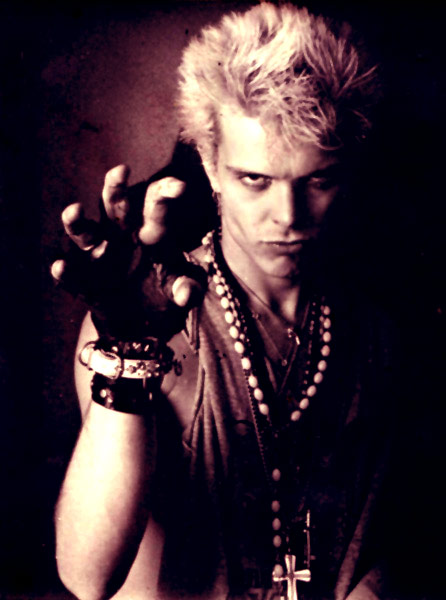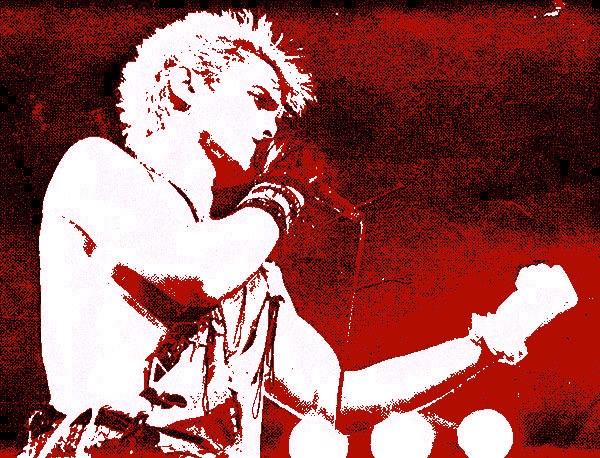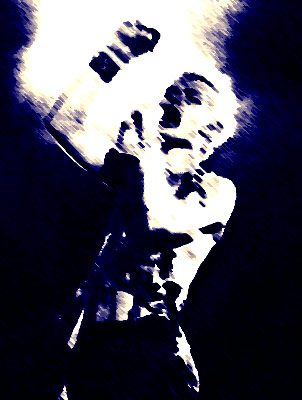
|
Search JoyZine with Google Site Search! |
by Joy Williams
Lately, there's been a tendency among critics to label Billy Idol as a "pop" star. I'm not too sure just why—perhaps because the music generated by the band is filled with pop sensibilities, clichés, even, though it is hard driving, grooving, rock'n'roll. But the lyrics! By pop standards, they are quite bizarre, as are the images they conjure up. It is a dark, surrealistic, often hellish world. Sort of an '80s version of a Heironymous Bosch painting. Complex images emerge from his imagination. "The best part is thinking it up," he said of his experience with video. "Right now," he stated in this interview in the KQAK studio in San Francisco, "they're important because they help me translate my songs to people." In striving toward this goal, Idol uses symbols and images rather than a storybook approach, to avoid interfering with the listener/viewer's perceptions. "It's more to do with what you conjure up in your imagination," he explained. "So the way I answer questions about video taking away imagination is, 'I don't think that's true.'" Nevertheless,, the images presented do stimulate and guide each individual's imaginative direction. And if the images send out confused messages? "White Wedding," for instance. Both the song and the video are imaginative, well-crafted ... and disturbing. Billy asserts that "It's not really about me, it's about people in black outfits, and the usual nasty violence and sex kind of thing. It's kind of like Billy Idol in Satanic Hell."
"It's not really about me" ... "Billy Idol in Satanic Hell" ??? Is Billy Idol (a stage name) just an image, or is what we see really all there is? He's intelligent and creative, but onstage and offstage (at least around fans and industry people), the sullen, violent, prurient sexual persona either is, or completely overwhelms, the really Billy. He says that this is a pretty weird society, very decadent, and that he is a part of that decadence. His background seems to support that statement. Early on he moved from Surrey to London, and soon became part of a circle of friends who were known as the "Bromley Contingent," which he described as a group of "transsexuals, bank clerks and pop stars." Decadent. Idol had emigrated to London for the music scene, but found that in the mid-'70s things were very stagnant. So he and his friends became their own entertainment. Before long, Idol had teamed up with vocalist Gene October and bassist Tony James to form Chelsea, which ultimately metamorphosed into Generation X (hereinafter referred to as Gen X). Eventually, Idol became lead singer and Gen X became part of the Brit New Wave explosion of the late '70s. The band produced three LP's, then broke up after four years. Their last song, "Dancing with Myself," managed to top the U.S. dance charts without ever having been released here.
In an unusual reversal of direction in today's rock world, Billy Idol emigrated to the United States. Figuring that since everybody else was just copying American black music anyway, he might as well go to the source so he became a resident of New York City. A move, incidentally, for which he was roundly chastised by the critics on both sides of the Atlantic. In NYC, Idol found people who "still like rock'n'roll," and that's the music his band plays. "It's taken me quite a long time to make sure I've got the right sort of group to project my music in the right sort of way to make an album, which, I think, is as good as or better than anything with Gen X." And I agree. The music on Billy Idol is much fuller, more vibrant than Gen X. "I don't have a back-up group," he continues. "Now, I've got Steve Stevens, my old pal from New York; Tommy Price, who used to be in Mink DeVille; and Steve Webster, who used to be in Parachute Club, on bass. I really wanted to open things up for Steve, who's been my friend for 2-1/2 years, ever since I got to New York." So, Billy Idol has this band that projects the image he wants, and he works with a video director to get the image he wants, and, as he said, "You try to figure out how you're gonna get across to people. I want to be sure that I'm in control of my image and that I'm in control of my music." This is what is disturbing and confusing to me: He has the intelligence and imagination of a (darkly) visionary poet, but the sensibilities of a randy 15-year-old. After a while I felt like saying, "Grow up, Billy, and you won't have to tell us how good you are." |


